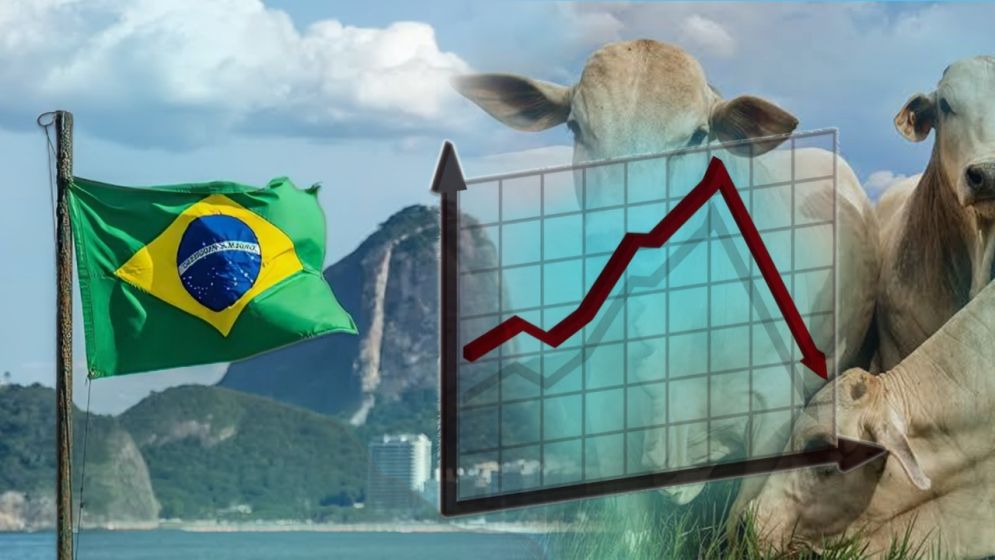How Brazilian beef import could wreck Bangladesh’s cattle economy

In Dhaka today, you can walk into a homegrown steakhouse and order a ribeye that was not flown in from Brazil or Australia but cut from locally reared cattle.
At Ahlann Agro (our business), we have begun supplying beef chunks–“mangsher khandi”--to a company experimenting with steaks for five-star restaurants and boutique eateries.
What once seemed impossible is now routine: Bangladeshi cattle feeding Bangladeshi appetites.
A decade ago, almost every steak on a Dhaka table came from abroad. That dependency drained dollars, raised health and halal concerns, and chained us to a global market indifferent to local realities.
But with beef imports banned, the vacuum created opportunity. Entrepreneurs opened butcheries and steakhouses; small farmers expanded herds; an entire lattice of forward and backward linkages–from feed suppliers to cold storage–began to take shape.
Out of necessity, Bangladesh grew a cattle economy that is now robust and, astonishingly, self-sufficient.
The results are striking. Last Qurbani Eid, the country had a surplus of 3.3 million cattle. Beef prices, unlike the spiraling costs of rice or lentils, have held steady for years. Adjusted for inflation, they have actually declined.
That stability is not accidental–it is the fruit of a sector that absorbed a geopolitical shock and turned it into a domestic success story.
When Narendra Modi’s government in India banned cattle exports in 2015, Bangladeshi farmers–long reliant on India’s cross-border trade–were forced to adapt. In doing so, they broke free of dependence and built resilience.
Still, not all is well. The government’s willful sabotage of the leather industry–ceding advantage to India–has collapsed hide prices, which in turn keeps beef artificially expensive.
Two decades ago, a cowhide fetched 20,000 takas; had that value been preserved, today’s beef could be 50 to 100 takas cheaper per kilo. Add to that the scarcity of grazing land and the import-dependent cost of feed, and it is no surprise consumers feel the pinch.
Yet even as local farmers battle these obstacles, Brazil has made an audacious offer: to export beef here at $1 a kilo, set up meat plants, and secure halal certification. It is a tempting proposition but a dangerous one.
If accepted, it could undercut a sector that Bangladeshi farmers built with grit and sacrifice over the past decade.
-68a95feada09e.png)
A bad choice for import
On the surface, the Brazilian option looks irresistible: cheap animal protein for a country where food inflation bites hard. But beneath the surface lies a more troubling possibility–that such imports could dismantle Bangladesh’s thousand-year-old micro-scale cattle economy, painstakingly nurtured by millions of small farmers.
The real question, then, is why Brazil is willing to sell beef at half or even a third of its own domestic price. In Brazilian supermarkets, beef retails between $2 and $3 a kilo. How, then, can the same product cross the ocean for just $1? The answer lies less in generosity than in geopolitics and market strategy.
The United States recently imposed a punishing 40 percent reciprocal tariff on Brazilian imports, on top of an existing 10 percent base duty. Almost overnight, Brazilian beef exports to the U.S. collapsed by 80 percent, falling from nearly 48,000 tons in April to under 10,000 by July.
That sudden loss of access to one of their most lucrative markets has put Brazilian exporters on edge, with an anticipated $1 billion shortfall in the second half of the year.
Faced with this blow, they are scrambling to carve out new destinations for their beef–in Asia, the Middle East, and, now, Bangladesh.
But the $1 offer is not what it seems. Brazil is not preparing to ship premium cuts of sirloin and ribeye to Dhaka. Instead, the bargain-basement price reflects the kind of meat that does not sell in its own domestic market: frozen carcasses, fatty trimmings, offal, and low-grade leftovers.
In Bangladesh, this would be recognized for what it is–“chhatir mangsho,” scrap meat fit more for dumping than dining. The danger is clear: by allowing such imports, Bangladesh could turn into a disposal site for Brazil’s rejects, compromising public health in the process.
There is another layer to this gambit. Bangladesh is a sizable beef market, and Brazilian exporters know that by entering cheaply, they could crowd out local producers and, over time, dominate the supply chain.
More importantly, their eye is not just on Bangladesh but on the Gulf. To reach Saudi Arabia, Qatar, or the UAE, Brazilian exporters need Halal certification. By obtaining it through Bangladesh, they could unlock far more lucrative Muslim markets, where beef fetches higher prices and greater margins.
Bangladesh, then, is not the end goal—it is the gateway.
-68a9600f967b7.png)
The deeper impact
So, what Brazil presents as an opportunity is, in fact, a calculated strategy: flood Bangladesh with cheap meat, secure a halal stamp, and then march into the Middle East with credibility in hand.
And for Bangladesh, the choice is not between cheap beef and expensive beef–it is between safeguarding its farmers or surrendering the future of its cattle economy to foreign dumping.
A kilo of steak on the table may cost less today, but the long-term price could be devastating.
And there are geopolitical risks. Washington’s tariffs on Brazil were not merely economic–they were a warning shot in an ongoing trade war. Should Bangladesh now align itself with Brazilian beef for the sake of cheap imports, it risks being seen as helping America’s rival.
India’s troubles after importing Russian oil under similar circumstances should serve as a cautionary tale. Bangladesh cannot afford to gamble its fragile diplomacy for discounted meat.
The danger is not confined to cattle rearers only. In a tightly linked protein economy, the price of beef determines the price of fish, poultry, and eggs. Flooding the market with cheap Brazilian beef will ripple across these sectors, crushing livelihoods in industries already vulnerable to volatility.
Even a “limited” introduction of frozen imports would be disastrous. In Bangladesh, weak enforcement ensures that anything introduced into the market quickly seeps into mainstream circulation.
The collapse of rice mills under the weight of cheap government rice offers a sobering analogy. Consumers may not buy Brazilian meat directly, but its presence would distort the entire supply chain, pushing smallholders to ruin.
Beyond that, Bangladesh has real export potential of its own. Unlike Brazil or India, we possess a unique comparative advantage: as a Muslim-majority country, our beef already carries intrinsic credibility in Halal markets.
The Gulf states pay premiums for meat slaughtered under strict religious standards, and Bangladesh could claim a significant share of that trade if it invests strategically.
But if Brazil sets up processing plants in Dhaka, secures Halal certification under our name, and then ships the meat abroad, Bangladesh will watch its competitive edge vanish before it had the chance to mature.
Also, the timing could not be worse for our fledgling meat-processing sector, which is only just beginning to supply premium cuts to high-end restaurants and even to overseas buyers.
These are industries born from the very import restrictions that forced Bangladesh to build its own cattle economy in the first place. To open the door now to Brazil’s dumping is to destroy this progress in its infancy.
-68a9602c6ab47.png)
What will yield real benefits?
If Brazil truly wished Bangladesh well, it would not be dangling frozen carcasses in front of us at a dollar a kilo. It would be offering something far more valuable: good breeds and technology.
Even the Brazilian ambassador admitted that their cattle produce two to three times more meat than ours. If policymakers genuinely want cheaper beef for Bangladeshi households, the path is clear–strengthen local capacity instead of importing the very product that undermines it.
Importing meat while refusing to import high-yield breeds to protect dairy interests is not policy; it is hypocrisy. Give our farmers the tools, and they will deliver beef at a lower cost than Brazil ever could.
Equally urgent is the revival of Bangladesh’s leather sector, once a national strength and now a casualty of neglect and misplaced priorities.
At the turn of the millennium, a cowhide from a 20,000 taka animal fetched nearly a quarter of that price. Today, even with cattle valued at five times as much, hides are practically worthless.
This collapse is not natural; it is manufactured. India’s leather exports have grown from $3 billion in 2000 to $20 billion today, while ours have withered. Reviving this industry would ease the cost of beef in ways that cheap imports never will.
A functioning leather economy would mean higher hide values, healthier margins for farmers, and lower meat prices for consumers–all without sacrificing sovereignty.
Instead of scapegoating farmers, policymakers should recognize their indispensable role. It is the farmers who are driving breed improvements, creating traceability systems, building simplified Qurbani services, and sustaining cottage industries.
During Eid, when cattle prices dip at farms but soar in city markets, it becomes clear that they are not the ones manipulating costs. Rather than blaming them, we should be protecting them.
Every emerging industry in the world is shielded from predatory competition until it can stand on its own. Having only just broken free from dependence on India, Bangladesh’s cattle sector deserves no less.
We have to understand that the cattle economy is the beating heart of an ecosystem that stretches from butchers to blacksmiths, from leather workers to poultry farmers whose prices move with beef.
To jeopardize it for the sake of cheap Brazilian imports is to risk unraveling one of the last truly broad-based rural industries left in Bangladesh.
That is why Brazil’s offer is dangerous. They sell beef at $2 or $3 a kilo at home, yet are eager to unload it here at half that price to protect their own farmers and industries.
And yet, we remain a nation so adrift that our policymakers seem ready to welcome it, while our urban middle classes salivate at the prospect of a 125-taka steak.
To them I say this: if you dismantle an entire domestic industry for the short-term thrill of cheap meat, the day will come when you will pay 2,000 takas for the same beef, and no one will be left to save you.
—
Sagor Hasnath is a former government employee turned-entrepreneur. He is the CEO of Ahlan Agro.

